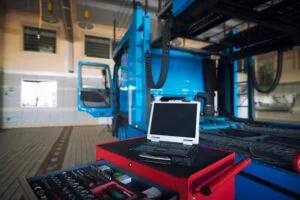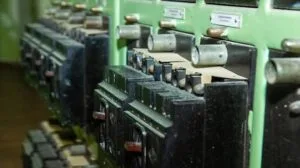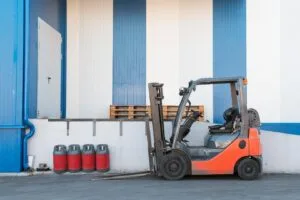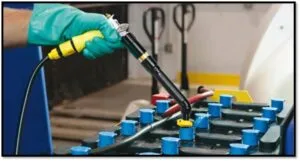Forklift batteries are the backbone of any warehouse, distribution center, or manufacturing facility that uses electric-powered material handling equipment. These batteries work around the clock to support operations that run day and night, seven days a week. Still, like all machinery, forklift batteries need regular inspections so that they can last as long as they should and perform at their peak level.
Industrial Batteries Accessories Ltd. recognizes battery care as an essential activity that can be the backbone of maximizing efficiency and even the lifespan of your fleet. Among its most important practices in keeping those forklifts running smoothly is conducting regular battery inspections. In this blog, we’ll look further into the importance of inspection, key forklift battery inspection tips, and how it can help prolong one’s forklift’s life.
Why Forklift Battery Inspections are Important
The forklift’s battery, just like every other part of it, degrades over time. Through regular inspections, you will prevent unforeseen failures that may result in a halt in your operations. Regular forklift battery inspections ensure that potential issues are detected early so they don’t develop into cost-prohibitive problems. Here are a few reasons why these inspections are important:
Prevention of Unplanned Downtime
A battery failure can significantly delay warehouse operations. Regular inspections help identify issues early, reducing the chances of unexpected downtime.
Cost Efficiency
Proper maintenance can help avoid costly repairs or replacements. By catching problems before they worsen, you can save money on both parts and labor.
Battery Longevity
Forklift batteries can be costly, so they last only as long as necessary. Maintaining appropriate operating conditions and performance will extend their longevity and give you more ROI.
Better Performance: It works better as the best condition of the battery determines a well-performing forklift. Smoother operations and improved productivity
Key Tips When Checking Over Forklift Batteries
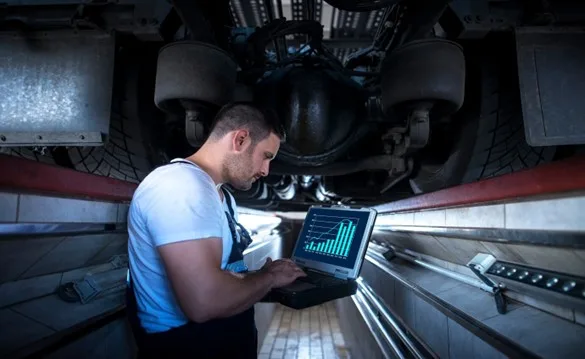
Regular inspection is the first step toward ensuring that your forklift batteries are always in the best condition. Here are several essential forklift battery inspection tips to follow:
1. Check the Water Levels
Forklift batteries, especially flooded lead-acid batteries, require proper water levels to function efficiently. Over time, the electrolyte levels can decrease due to evaporation, especially during charging. If the water level drops too low, the battery could be damaged.
Tip: Check water levels frequently, especially during warm seasons when evaporation tends to be greater. Add only distilled water to the cells.
2. Check for Corrosion
One of the most common causes of battery failure is corrosion on the positive and negative terminals and cables. The terminals can rust or corrode due to the leakage of battery acid from the battery cells over time. This tends to increase the resistance generated and reduce battery efficiency.
Tip: Check the terminals of your battery for corrosion. Clean those terminals regularly using a mix of baking soda and water, and ensure that the connections are snug.
3. Inspect the Cartridge for Cracks and Leaks
Visible cracks and leaks in the battery casing indicate that your forklift battery is at risk of sustaining further damage. Leaks will lower battery efficiency and pose a hazard in environments where workers are exposed to heavy materials.
Tip: Inspect the battery casing very closely at each inspection. Cracks and leaks should be treated with urgency, and a new battery should be ordered to avoid further damage.
4. Keep Voltage and Charge Levels Correct:
The battery needs proper voltage and charge level maintenance. Undercharging and overcharging will reduce the battery’s lifetime and efficiency. Periodic monitoring of voltage levels ensures that your forklift batteries are being charged properly.
Tip: Use a voltmeter to check the voltage and ensure it is within the manufacturer’s recommended range. If you notice any discrepancies, it may be time to inspect the charger or the battery itself.
5. Clean the Battery Compartment
Dirt and debris can accumulate in the battery compartment, possibly interfering with the battery’s performance. Excessive dirt can also lead to overheating, which can reduce battery life.
Tip: Clean the battery compartment often to ensure there is no build-up of dirt and debris. The battery has to be dry and free from moisture. If moisture gets inside, the metal can corrode. Temperature Fluctuations Checking 6
Temperature plays a critical role in battery efficiency. Severe heat or cold will impact battery performance, even causing damage. The battery’s temperature changes must be inspected when the forklift operates outdoors or under severe conditions.
Tip: Avoid subjecting the forklift to temperatures above the manufacturer’s recommended range. Store and charge batteries under temperature-controlled conditions whenever feasible.
7. Check Battery Chargers
The charger is as important as the battery. A faulty charger can cause undercharging or overcharging, which can shorten the lifespan of your forklift battery. Inspect the charger regularly to ensure it is functioning properly.
Tip: Regularly inspect the charger for any signs of damage or wear. Ensure the charging process is consistent and that the charger is set to the correct voltage.
When Should You Perform Your Forklift Battery Inspections?

To ensure that forklift batteries are in optimal condition, routine inspections should be part of a regular maintenance schedule. For your convenience, here’s a suggested schedule for the inspection of forklift batteries:
Every day, inspection
Look at the battery for signs of damage, liquid leaks, or corrosion before it is put into operation each day. Be sure to clean the terminals and check the water levels in flooded batteries.
Weekly inspections
Increase the extent of your inspection to include checks on voltage levels, cables for wear, and cleaning the terminals if necessary.
Monthly Inspections
At least once a month, check the battery’s overall performance and condition. Look for cracks, leaks, or damage to the casing, and inspect the charger for proper functionality.
Quarterly Inspections
Conduct a thorough check on all aspects of the forklift battery, including the battery’s age, performance, and temperature fluctuations. Review the entire forklift charging system and ensure that the battery is operating at its peak.
How Regular Inspections Contribute to Fleet Longevity
Routine forklift battery inspections are essential not only for the individual lifespan of each battery but also for the overall longevity of your forklift fleet. By maintaining your batteries through regular inspections, you’re ensuring that:
- Less downtime occurs, allowing for a more efficient workflow in your warehouse or manufacturing facility.
- Battery replacements are planned and not unexpected, saving your company time and money.
- Operational efficiency is high because well-maintained batteries ensure that forklifts work at their fullest capacity.
- Safety is also enhanced because potential dangerous issues are caught earlier, such as leaks or defective chargers.
Conclusion
Regular forklift battery inspections go hand in hand with ensuring longevity and efficiency within your fleet. By conducting forklift battery inspections regularly, you can save time from costly downtime while operating your forklift in better working conditions with its longer lifespan. According to this guide, following these forklift battery inspection tips ensures maintaining your forklifts’ optimal levels for continuous smoothness and reliability of warehouse operation from day to day.
At Industrial Batteries Accessories Ltd., we want to help you maintain your fleet of forklifts in the best condition possible. We supply high-quality forklift batteries and provide maintenance services, helping ensure that your equipment stays powered up and prepared for any task.
By incorporating regular battery inspections into your maintenance routine, you can protect your investment and maximize the efficiency of your operations.


